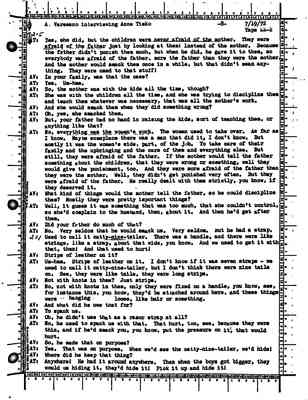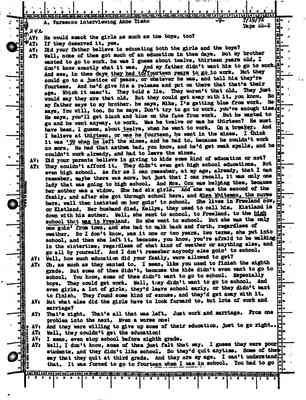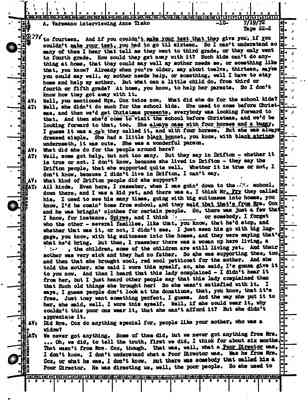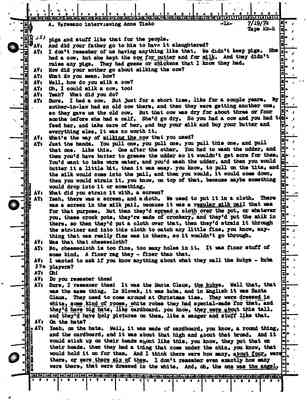Pages
43
A. Varesano interviewing Anne Timko -8- 7/19/72 Tape 22-2
AT: Yes, she did, but the children were never afraid of the mother. They were afraid of the father just by looking at them! Instead of the mother. Because the father didn't punish them much, but when he did, he gave it to them, so everybody was afraid of the father, more the father than they were the mother. And the mother would smack them once in a while, but that didn't mean anything. They were used to that stuff! AV: In your family, was that the case? AT: Yes. Um-hum. AV: So, the mother was with the kids all the time, though? AT: She was with the children all the time, and she was trying to discipline them and teach them whatever was necessary, that was all the mother's work. AV: And she would smack them when they did something wrong? AT: Oh, yes, she smacked them. AV: But, your father had no hand in raising the kids, sort of teaching them, or anything like that? AT: No, everything was the woman's work. The women used to take over. As far as I know. Maybe someplace there was a man that did it, I don't know. But mostly it was the woman's side, part, of the job. To take care of their family and the upbringing and the care of them and everything else. But still, they were afraid of the father. If the mother would tell the father something about the children, that they were wrong or something, well they would give the punishment, too. And they were more afraid of the father than they were the mother. Well, they didn't get punished very often. But they were afraid of the father. He really dealt with them strictly, you know, if they deserved it. AV: What kind of things would the mother tell the father, so he could discipline them? Mostly they were pretty important things? AT: Well, it guess it was something that was too much, that she couldn't control, so she'd complain to the husband, then, about it. And then he'd get after them. AV: Did your father do much of that? AT: No. Very seldom that he would smack us. Very seldom. But he had a strap. Used to call it catty-nine-tailer. There was a handle, and there were like strings, like a strap, about that wide, you know. And we used to get it with that, then! And that used to hurt! AV: Strips of leather on it? AT: Um-hmm. Strips of leather on it. I don't know if it was seven straps - we used to call it catty-nine-tailer, but I don't think there were nine tails on. See, they were like tails, they were long strips. AV: Not with knots in them? Just strips. AT: No, not with knots in them, only they were fixed on a handle, you know, see, for instance this, you know, they'd be attached around here, and these things were hanging loose, like hair or something. AV: And what did he use that for? AT: To spank us. AV: Oh, he didn't use that as a razor strap at all? AT: No, he used to spank us with that. That hurt, too, see, because they were thin, and if he'd spank you, you know, put the pressure on it, that would hurt. AV: So, he made that on purpose? AT: Yes. That was on purpose. When we'd see the catty-nine-tailer, we'd hide! AV: Where did he keep that thing? AT: Anywhere! He had it around anywhere. Then when the boys got bigger, they would be hiding it, they'd hide it! Pick it up and hide it!
44
A. Varesano interviewing Anne Timko -9- 7/19/72 Tape 22-2
AV: He would smack the girls as much as the boys, too? AT: If they deserved it, yes. AV: Did your father believe in educating both the firls and the boys? AT: Well, none of them got much of an education in them days. But my brother wanted to go to work, he was I guess about twelve, thirteen years old, I don't know exactly what it was. And my father didn't want him to go to work. And see, in them days they had to be fourteen years to go to work. But they could go to a justice of peace, or whatever he was, and tell him they're fourteen. And he'd give him a release and put on there that that's their age. Which it wasn't. They told a lie. They weren't that old. They just would say they are that old. But they could get away with it, you know. So my father says to my brother, he says, Mike, I'm getting blue from work. He says, You will, too. So he says, Don't try to go to work, you've enough time. He says, you'll get black and blue on teh face from work. But he wanted to go and he went anyway, to work. Was he twelve or was he thirteen? He must have been, I guess, about twelve, when he went to work. On a breaker. And I believe at thirteen, or was he fourteen, he went in the mines. I think it was '59 when he left the mines, and he had to, because he couldn't work no more. He had that asthma bad, you know, and he'd get weal spells, and he couldn't work already, and had to leave the mines. AV: Did your parents believe in giving to kids some kind of education or not? AT: They couldn't afford it. They didn't even get high school educations. Not even high school. As far as I can remember, at my age, already, that I can remember, maybe there was more, but just that I can recall, it was only one lady that was going to high school. And Mrs. Coxe was helping them, because her mother was a widow. She had six girls. And she was the second of the family, and after she got through school here, and Miss Whiteman, the nurse here, well then insisted on her goin' to school. She lives in Freeland now, or Kistland. Her husband died, Kellys, they used to call him. Kistland is down with his mother. Well, she went to school, to Freeland, to high school that was in Freeland. She she went to school. But she was the only on goin' from town, and she had to walk back and forth, regardless of weather. So I don't know, was it one or two years, two terms, she put into school, and then she left it, because, you know, you're afraid to be walking in the wintertime, regardless of what kind of weather or anything else, and go all by yourself. And I don't remember anybody else goin' to school. AV: Well, how much education did your family, were allowed to get? AT: Oh, as much as they wanted to. I mean, like you used to finish the eighth grade. But some of them didn't, because the kids didn't even want to go to school. You know, some of them didn't want to go to school. Especially boys. They could get work. Well, they didn't want to go to school. And even girls, a lot of girls, they'd leave school early, or they didn't want to finish. They found some kind of excuse, and they'd get away with it. AV: But what else did the girls have to look forward to, but lots of work and marriage? AT: That's right. That's all that was left. Just work and marriage. From one problem into the next. Even a worse one! AV: And they were willing to give up some of their education, just to go right... AT: Well, they couldn't get the education! AV: I mean, even stop school before eighth grade. AT: Well, I don't know, some of them just felt that way. I guess they were poor students, and they didn't like school. So they'd quit anytime. Some of them say that they quit at third grade. And they are my age. I can't understand that. It was forced to go to fourteen when I was in school You had to go
45
A. Varesano interviewing Anne Timko -10- 7/19/72 Tape 22-2
to fourteen. And if you couldn't make your test that they give you, if you couldn't make your test, you had to go til sixteen. So I can't understand so many of them I hear that tell me they went to third grade, or they only went to fourth grade. How could they get away with it? Such kids can't do anything at home, that they could say well my mother needs me, or something like that, you know? Already when you're older, say about twelve, thirteen, maybe you could say well, my mother needs help, or something, well I have to stay home and help my mother. But what can a little child do, from third or fourth or fifth grade? At home, you know, to help her parents. So I don't know how they got away with it. AV: Well, you mentioned Mrs. Cox twice now. What did she do for the school kids? AT: Well, she didn't do much for the school kids. She used to come before Chirstmas, and then we'd get Christmas presents, everybody was looking forward to that. And then she'd come to visit the school before Christmas, and we'd be looking forward to that, too. She always came with four horses and a buggy, I guess that was a cab they called it, and with four horses. But she was always dressed simple. She had a little black bonnet, you know, with black strings underneath, it was cute. She was a wonderful person. AV: What did she do for the people around here? AT: Well, some got help, but not too many. But they say in Drifton - whether it is true or not. I don't know, because she lived in Drifton - they say the Drifton people, that she supported quite well. Whether it is true or not, I don't know, because I didn't live in Drifton. I can't say. AV: What kind of Drifton people did she support? AT: ALl kinds. Even here, I remember, when I was goin' down to the school, down there, and I was a kid yet, and there was a, I think Mr. Fry they called him. I used to see him many times, going with big suitcases into homes, you know, I'd be comin' home from school, and they said that that's from Mrs. Cox and he was bringin' clothes for certain people. So, there was just a few that I know, for instance, Spires, and I think or somebody, I forget who the other - several families, like that, you know, that he'd stop, and whether that was it, or not, I didn't see. I just seen him go with the big luggage, you know, with big suitcases into the homes, and they were saying that's what he'd bring. But then, I remember there was a woman up here living, a widow, the children, some of the children are still living yet. And their mother was very sick and they had no father. So she was supporting them, too, and then that she brought wool, red wool petticoat for the mother. And she told the mother, she said I wore this myself, so, she said, I'm gonna give it to you now. And then I heard that this lady compained - I didn't hear it from her, but I just heard other people say that this lady complained then that Such old things she brough her! So she wasn't satisfied with it. I says, I guess people don't look at the donations, that, you know, that it's free. Just then want something perfect. I guess. And the way she put it to her, she said, well, I wore this myself. Well, if she oculd wear it, why couldn't this poor one wear it, that she can't afford it? But she didn't appreciate it. AV: Did Mrs. Cox do anything special for, people liek your mother, who was a widow? AT: We never got anything. Some of them did, but we never got anything from Mrs. ...Oh, we did, to tell the truth, first we did, I think for about six months. That wasn't from Mrs. Cox, though. That was, well, what a Poor Director was, I don't know. I don't understnad what a Poor Director was. Was he from Mrs. Cox, or what he was, I don't know. But there was somebody that called him a Poor Director. He was directing us, well, the poor people. So she used to
46
A. Varesano interviewing Anne Timko -11- 7/19/72 Tape 22-2
get a bag of flour a month, and a bag of flour at that time was four dollars, that was very expensive in 1911. I mean, for the wages and everything, you know. For about six months, I think, she got a bag of flour. The order would come to the store here, and they would deliver it to her, and after that they stopped it. So then one day my mother asked me to go - it was a Davis, from Freeland, that was the Poor Director at that time - so my mother asked me, because she couldn't speak English, so she asked me to go, you know, with her and talk to this man, you know, that why did they stop it? And he says, Well, you have a son working. And she said, Well, my son doesn't make enough to support the family. And if he has to be supporting the family and he won't have anything himself, he'll leave then. And the man says to her, Well, won't he be ashamed to leave you? And they stopped it, she never got it any more. Now some others I heard them saying they got shoes, and they got orders, food, you know, orders, and we never got it. AV: Why do you think they got some of these benefits from Mrs. Cox? AT: I don't know. I don't know. Well, I know this friend of mine, this Mrs. Wasko's sister-in-law, the one that is in California now, well, many a time she'd have pretty good shoes, and she would take them off and put on old shoes, and she'd go down to the nurse - she'd tell me this herself - she said, I'm going down to the nurse. I'm gonna show her what kind of shoes I have. She'll give me a ticket to go to the store to get new shoes. And she did! She used to get them! So, I don't know, was it just some people lucky, or did they know how to go about it, or what it was. I don't know. But we didn't get it. I say, for about six months Mom got, well I say six bags of flour, a hundred pound of flour. That was about all, and we never got anything afterward. AV: Outside of that, Mrs. Cox didn't have any kind of widow benefits around here? AT: Not that I know of. Some widows got something, but I don't know how they got it. AV: You know, I heard that one of the things she did, well, somebody said, was to give all the widows free rent, to pay their rent. AT: Well, my brother was working, so they'd take it out of his check. See, the company would take it off his check. AV: He was working at that time, where? AT: In the mines. In the mines, when my father died. Because he was seventeen, and he went in the minds when he was about fourteen. AV: And that's why they didn't give you anything... AT: I guess that might have been it, I don't know, but that must have been it. AV: Oh, boy. I wanted to ask, you know, you spoke about the people having cows and chickens and things like that. They had slaughter day on Thanksgiving, didn't they? AT: Well, yes, because that was like, you might say, along the weekend, you know, they had time to work with that stuff. And most men weren't working then, so that's the way they used to - and the weather was getting cold already, it was the season for it. So they could slaughter. Even then, many times it would spoil, because there was no refrigeration, you had nowhere to put it. AV: Who did the killing? AT: There were some men in town that used to do the killing. And some people would do it themselves, you know, some men from their own family, you know, from the home, they could do it themselves. Usually, there was a Mr. Horvath here, that he used to do a lot of killings through town. And then there was another man, I don't remember his name. But Mr. Horvath was the mine one that used to do a lot of killing, you know, to kill the cows and
47
A. Varesano interviewing Anne Timko -12- 7/19/72 Tape 22-2
pigs and stuff like that for the people. AV: And did you father go to him to have it slaughtered? AT: I don't remember of us having anything like that. We didn't keep pigs. She had a cow, but she kept the cow for butter and for milk. And they didn't raise any pigs. They had geese or chickens that I know they had. AV: How did your mother go about milking the cow? AT: What do you mean, how? AV: Well, how do you milk a cow? AT: Oh, I could milk a cow, too! AV: Yeah? Whwat did you do? AT: Sure. I had a cow. But just for a short time, like for a couple years. My mother-in-law had an old cow there, and then they were getting another one, so they gave us the old cow. But that cow was dry for about three or four months before she had a calf. She'd go dry. So you had a cow and you had to feed her, and take care of her, and buy your milk and buy your butter and everything else, it was no worth it. AV: What's the way of milking the cow that you used? AT: Just the hands. You pull one, you pull one, you pull this one, and pull that one. Like this. One after the other. You had to wash the udder, and then you'd have butter to grease the udder so it wouldn't get sore for them. You'd want to take warm water, and you'd wash the udder, and then you would butter it a little bit, then it was easy, you know, to pull on the tits, and the milk would come into the pail, and then you would, it would come down, then you would strain it, you know, on top of that, because maybe something would drop into it or something. AV: What did you strain it with, a screen? AT: Yeah, there was a scren, and a cloth. We used to put it in a cloth. There was a screen in the milk pail, because it was a regular milk pail that was for that purpose. But then they'd spread a cloth over the pot, or whatever you, these crock pots, they're made of crockery, and they'd put the millk in there, so then they'd put a cloth over that, then they'd strain it through the strainer and into this cloth to catch any little fine, you know, anything that was really fine was in there, so it wouldn't go through. AV: What that that cheesecloth? AT: No, cheesecloth is too fine, too many holes in it. It was finer stuff of some kind. A finer rag they - finer than that. AV: I wanted to ask you if you know anything about what they call the kubys - kuba players? AT: Oh! AV: Do you remember them! AT: Sure, I remember them! It was the Santa Claus, the kubys. Well that, that was the same thing. In Slovak, it was kuba, and in English it was Santa Claus. They used to come around at Christmas time. They were dressed in white, some kind of robes, white robes they had a special-made for that, and they'd have big hats, like cardboard, you know, they were about this tall, and they'd have holy pictures on them, like a manger and stuff like that. AV: On the hats? AT: Yeah, on the hats. Well, it was made of cardboard, you know, a round thing, and the cardboard, and it was about that high and about that broad. And it would stick up on their heads about like this, you know, they put that on their heads. then they had a thing that come under the chin, you know, that would hold it on for them. And I think there were how many, about four, were there, or were there six of them. I don't remember even exactly how many were there, that were dressed in the white. And, oh, the one was the angel,




